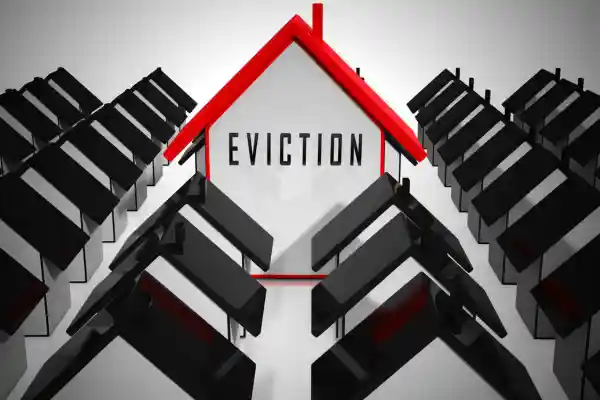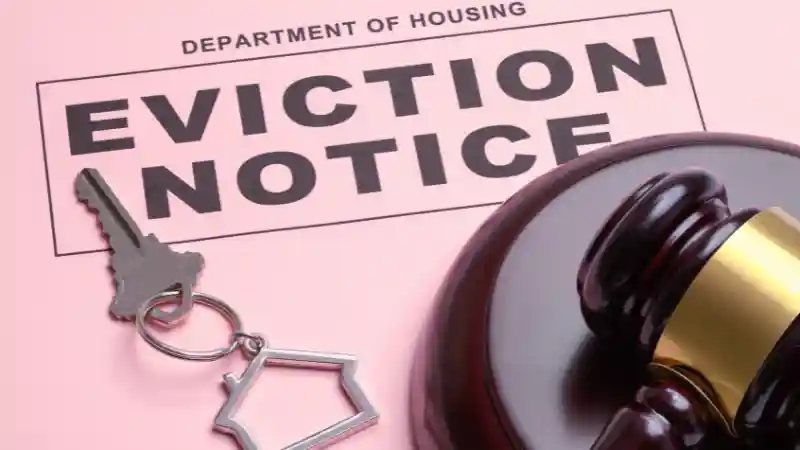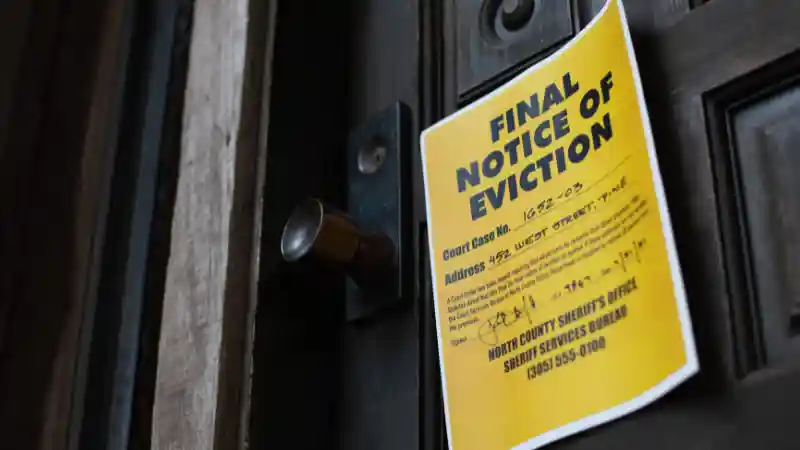How long does it take for an eviction to show up on your record? This is a question that is randomly asked, and it will be addressed in this article. Eviction records can have a significant impact on an individual’s housing prospects and financial well-being. Understanding the timeline of the eviction process, the factors affecting reporting time, and the implications of evictions on rental history is crucial for tenants navigating the rental market.
This also explains the intricacies of how long it takes for an eviction to come up on your record and the importance of eviction records. Now, let’s dive right into what you need to know about evictions on your record.
How Long Does It Take For An Eviction To Show Up On Your Record?

The timeline for eviction to come up on your record can vary depending on the specific circumstances and the policies of the reporting agencies. In general, an eviction can typically appear on your record within 30-60 days after the eviction judgment has been issued by the court. However, there may be instances where it takes longer for the eviction to be reported, so it is important to monitor your record regularly to ensure any inaccuracies are corrected on time.
Timeline Of Eviction Process
The timeline of the eviction process can vary depending on the local laws and regulations, as well as the specific circumstances of each case. However, a general timeline of the eviction process in the United States may include the following steps:
1. Notice To Vacate
The landlord typically begins the eviction process by giving the tenant a written notice to vacate the property. The length of the notice period may vary depending on state and local laws.
2. Filing Of Eviction Lawsuit
If the tenant fails to vacate the property by the deadline stated in the notice to vacate, the landlord may file an eviction lawsuit, also known as an unlawful detainer suit, with the court.
3. Court Hearing
The court will schedule a hearing where the landlord and tenant can present their case. The judge will then make a decision based on the evidence and arguments presented.
4. Judgment
If the court rules in favor of the landlord, a judgment for possession of the property may be issued. The tenant will usually be given a specific amount of time to vacate the property voluntarily.
5. Execution Of Writ Of Possession
If the tenant does not vacate the property by the deadline specified in the judgment, the landlord may request a writ of possession from the court. This allows law enforcement officials to physically remove the tenant and their belongings from the property.
The eviction process can take anywhere from a few weeks to several months, depending on the specific circumstances of the case and any delays in the legal process. Both landlords and tenants need to understand their rights and obligations under the law to ensure a smooth and fair eviction process.
Factors Affecting Reporting Time
The time it takes for an eviction to reflect on your record can be influenced by several factors:
1. Reporting Policies
Different reporting agencies may have varying procedures and timelines for updating eviction records. Some agencies may update their records quickly, while others may take longer to process and report eviction information.
2. Legal Process
The length of the eviction process can also impact when an eviction appears on your record. If the eviction process is prolonged due to legal challenges or delays in court proceedings, it may take longer for the eviction to come up on your record.
3. Landlord Action
Some landlords may report evictions to tenant screening agencies or credit bureaus promptly, while others may wait until after the eviction process is finalized or until the tenant has vacated the property.
4. Type Of Eviction
The type of eviction (e.g., for non-payment of rent, lease violation, or illegal activities) can also affect reporting times. Some types of evictions may be processed and reported more quickly than others.
5. Geographic Location
Eviction laws and procedures can vary by state and local jurisdiction. The reporting time for an eviction may be influenced by the specific laws and regulations governing evictions in the area.
6. Tenant Screening Practices
Some landlords or property management companies may conduct regular screenings of their rental applicants, which can result in evictions showing up on records more quickly.
Overall, the reporting time for an eviction can vary based on these factors and others. It is important to be aware of your rights and responsibilities as a tenant and to monitor your rental history regularly to ensure accurate information is being reported.
Impact Of Evictions On Rental History
Evictions can have a significant impact on rental history and can make it more challenging for individuals to secure future housing. Some of the key ways in which evictions can affect rental history include:
1. Negative Rental History
An eviction on your record can be seen as a red flag by future landlords or property managers. It may indicate to them that you have had previous issues with paying rent or following the terms of a lease, which can make them less likely to rent to you.
2. Difficulty In Finding Housing
Many landlords conduct background and credit checks on potential tenants, and an eviction on your record can lead to the automatic rejection of your rental application. This can limit your housing options and make it harder to find a place to live.
3. Higher Security Deposits
Some landlords may require higher security deposits or additional fees from tenants with evictions on their record, to offset the perceived risk of renting to them.
4. Limited Rental Opportunities
Evictions can stay on your rental history for several years, depending on state laws and the specific reporting policies of tenant screening agencies. This can further limit your rental opportunities and make it harder to find housing in the future.
5. Negative Impact On Credit Score
In some cases, evictions can also impact your credit score if the landlord or property management company reports the eviction to credit bureaus. A lower credit score can make it harder to secure other types of loans or financial opportunities in the future.
The impact of evictions on rental history can be significant and long-lasting. It is important to be proactive in addressing any issues that may lead to eviction and to work with landlords or property managers to resolve conflicts or payment disputes before they escalate to the eviction stage. If you do have an eviction on your record, you may need to take extra steps to demonstrate your reliability as a tenant to future landlords.
Checking And Disputing Eviction Records

If you believe an eviction record on your background check is inaccurate, you have the right to dispute it and request it be removed. Here are steps you can take to check and dispute eviction records:
1. Obtain A Copy Of Your Background Check
Request a copy of your background check from the tenant screening company that provided it to the landlord or property management company.
2. Review The Eviction Record
Carefully review the eviction record to make sure all information is accurate. Check for any mistakes in the dates, names, or other details.
3. Contact The Landlord Or Property Management Company
If you believe there is an error in the eviction record, contact the landlord or property management company to discuss the issue. Provide any documentation or evidence to support your dispute.
4. File A Dispute With The Tenant Screening Company
If the landlord or property management company is unwilling to correct the error, you can file a dispute with the tenant screening company that provided the background check. Provide all relevant information and documentation to support your dispute.
5. Contact The Credit Reporting Agencies
If the eviction record is also affecting your credit report, you can contact the credit reporting agencies (Experian, Equifax, TransUnion) to dispute the information on your credit report.
6. Seek Legal Assistance
If you are unable to resolve the issue on your own, you may consider seeking legal assistance from a lawyer or a tenant advocacy organization to help you dispute the eviction record.
It is important to act quickly and decisively if you believe there is an error in your eviction record, as having an eviction on your record can have serious consequences for your ability to rent in the future.
Strategies For Rebuilding Rental History
If you have a negative rental history, such as past evictions or late payments, it can be challenging to find new housing. However, there are strategies you can implement to rebuild your rental history and improve your chances of being approved for a rental property:
1. Be Upfront And Honest
When applying for a new rental property, be upfront and honest about your past rental history. Explain any negative incidents and what steps you have taken to rectify the situation.
2. Offer A Larger Security Deposit
To alleviate concerns about your rental history, offer to pay a larger security deposit upfront. This can show landlords that you are serious about making payments on time.
3. Provide References
If possible, provide references from previous landlords, employers, or other reputable sources who can vouch for your dependability and reliability as a tenant.
4. Get A Co-signer
If you have a trusted friend or family member who is willing to co-sign the lease with you, this can help reassure landlords of your financial responsibility.
5. Offer To Sign A Shorter Lease
Consider offering to sign a shorter lease, such as a six-month lease, to demonstrate your commitment to being a responsible tenant.
6. Build Your Credit
Improving your credit score can also help improve your chances of being approved for a rental property. Make sure to pay all bills on time, reduce outstanding debts, and check your credit report regularly for errors.
7. Seek Out Landlords Who Are Willing To Work With Tenants with Imperfect Rental Histories
Some landlords or property management companies may be more lenient with tenants who have negative rental histories. Look for rental properties with flexible leasing policies.
8. Consider Subletting Or Renting A Room
If you are having trouble securing a traditional lease, consider subletting a room or renting from a private homeowner who may be more willing to overlook past rental history issues.
Rebuilding your rental history may take time and persistence, but by taking proactive steps and demonstrating your commitment to being a responsible tenant, you can improve your chances of finding a new rental property.
Can You Remove An Eviction From Their Record?

It may be possible to remove an eviction from your record, but it can be a challenging process. If the eviction was wrongful or unjust, you may be able to appeal the eviction in court and have it removed from your record. Additionally, some states have laws that allow for the expungement or sealing of eviction records in certain circumstances. It is recommended to consult with a legal professional to determine the best course of action in your specific situation.
Does Moving Out Stop Eviction Proceedings?
In some cases, moving out before the eviction is completed can potentially stop the eviction proceedings. When a tenant voluntarily moves out before the court issues an eviction order, the landlord may consider the matter resolved and choose not to pursue further legal action. However, this can vary depending on the specific circumstances and the laws in place in the jurisdiction.
Tenants need to communicate with their landlord and understand their rights and responsibilities during the eviction process. Seeking legal advice or assistance from a tenant advocacy organization can also help navigate the situation.
What Is Included In A Tenant Screening Report?
A tenant screening report typically includes the following information:
1. Credit Check
This includes the tenant’s credit score and credit history, including any outstanding debts, late payments, bankruptcies, and collection accounts.
2. Rental History
This includes information about the tenant’s previous rental properties, including the duration of their tenancy, rent payment history, and any issues or complaints.
3. Employment Verification
This includes information about the tenant’s current employment status, income, and length of employment.
4. Criminal Background Check
This includes any criminal records or convictions that the tenant may have, including information about the type of offense and when it occurred. See how long a felony record does last.
5. Eviction History
This includes information about any previous evictions or legal disputes with previous landlords.
6. Personal References
This includes information from character references provided by the tenant.
7. Social Security Number Verification
This ensures that the tenant has provided accurate personal information.
It is important to note that the specific information included in a tenant screening report may vary depending on the screening company or service used. Additionally, landlords and property managers should comply with fair housing laws and regulations when conducting tenant screenings.
It is important to be aware that an eviction can have long-term consequences on your rental history and credit report. It is best to address any eviction proceedings promptly and work with landlords or property management companies to find a resolution before it escalates to court. Remember that prevention is always better than dealing with the repercussions of an eviction on your record.

Human right activist, writer, married and passionate about felons. Pearl loves to travel, cook and hates injustice of any kind. She gives and writes helpful info people can read for enlightenment.
